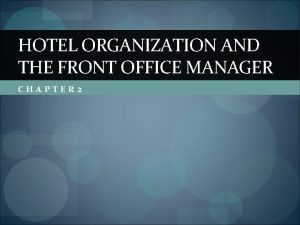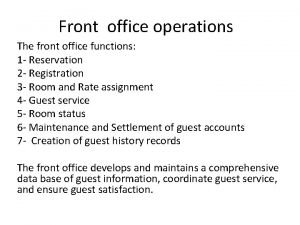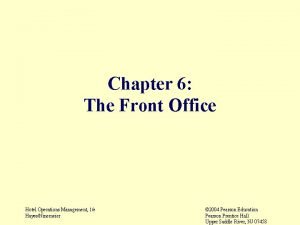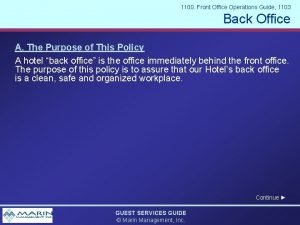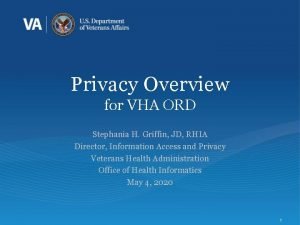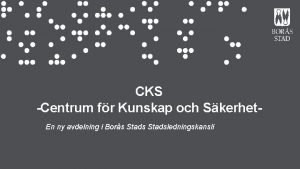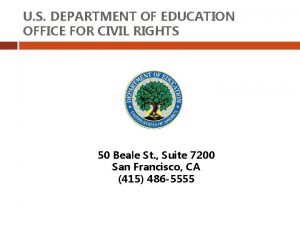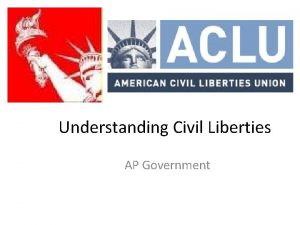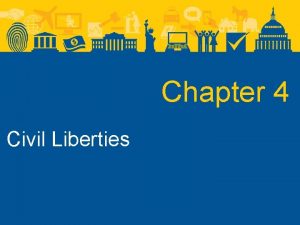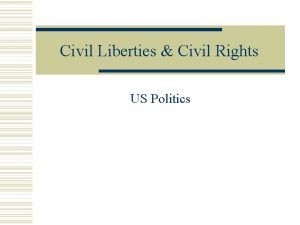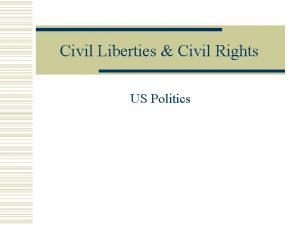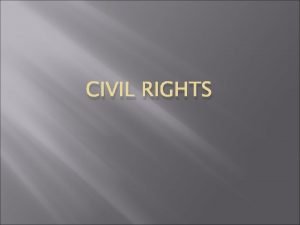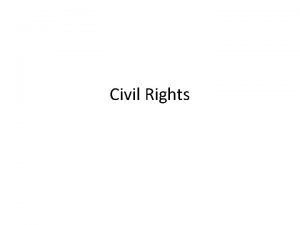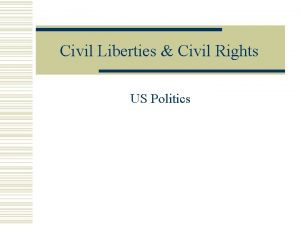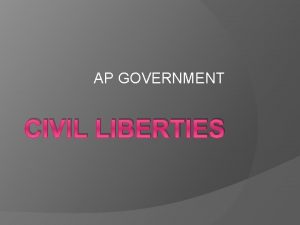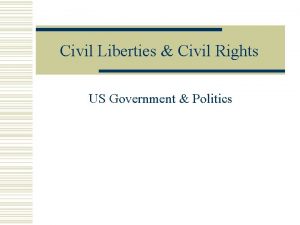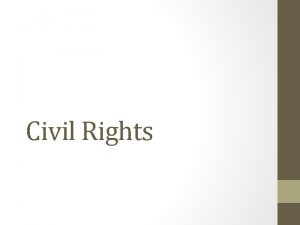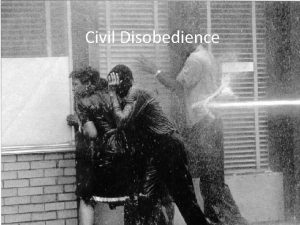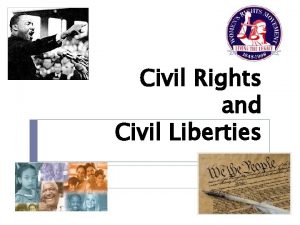U S Department of Education Office for Civil



































- Slides: 35

U. S. Department of Education Office for Civil Rights (OCR)

OCR Presents: Navigating OCR: OCR’s Case Processing Procedures and Resolution Tools 2

What Is OCR? § The Office for Civil Rights (OCR) is a part of the U. S. Department of Education and has headquarters in Washington, D. C. and has 12 enforcement offices § OCR's mission is to ensure equal access to education and to promote educational excellence throughout the nation through vigorous enforcement of civil rights 3

Laws Enforced by OCR Title VI: (race, national origin and color) Title IX: (sex) Section 504 of the Rehabilitation Act and Title II of the Americans with Disabilities Act: (disability) Age Discrimination Act: (age) Boy Scouts of America Equal Access Act: (prohibits denial of equal access or a fair opportunity to meet to, or discrimination against, any group affiliated with the Boy Scouts or with other Title 36 youth groups) 4

OCR’s Jurisdiction OCR has jurisdiction over entities that receive Federal financial assistance from the Department of Education, such as: – state education agencies – elementary and secondary school systems – colleges and universities – state vocational rehabilitation agencies OCR also has jurisdiction over certain public entities under Title II of the Americans with Disabilities Act of 1990, such as: – public elementary and secondary school systems – public colleges and universities – public libraries and state vocational rehabilitation agencies Under the Boy Scouts Act, OCR has jurisdiction over public elementary and secondary schools, and State and local educational agencies, that receive funds made available through the Department of Education. 5

OCR Enforcement n n An important responsibility of OCR is the investigation and resolution of complaints of discrimination. OCR also initiates some cases on its own. These are called compliance reviews, and they permit OCR to target resources on compliance problems that appear particularly acute. 6

OCR Enforcement OCR also provides technical assistance to help institutions achieve voluntary compliance with the civil rights laws that OCR enforces and to help parents and students understand their rights and responsibilities. Technical assistance includes, for example: – Presentations – Responses to telephone and written inquiries – Workshops – Consultation 7

Complaint Resolution OCR's goal is to resolve complaints of discrimination promptly and appropriately. OCR may use a variety of approaches to resolve the complaint. 8

Investigation of Complaints of Discrimination: FAQs n n How do I file a Complaint? Which Complaints will be Investigated by OCR? Will the Recipient Know I have filed a complaint with OCR? An Investigation: What Can I Expect? How Will the Complaint be Resolved? 9

How do I file a Complaint? n n n A complaint is a written statement to the Department alleging that the rights of one or more persons have been violated and requesting the Department to take action. The complaint should include a written explanation of what happened; a way to contact the complainant; identification of the person or group injured; and identification of the person or institution alleged to have discriminated. Complaints may be filed online as well as by mail, fax, or in person. 10

Which Complaints will be Investigated by OCR? OCR Case Processing Manual (2008): OCR will investigate allegations, which, if true, would constitute a violation of one of the laws it enforces. 11

Which Complaints will be Investigated? Opening the allegations for investigation in no way implies that OCR has made a determination with regard to their merits. During the investigation, OCR is a neutral fact-finder, collecting and analyzing relevant evidence from the complainant, the recipient, and other sources, as appropriate. OCR will ensure that its investigation is legally sufficient and is dispositive of the allegations, in accordance with the provisions of Article III of the Case Processing Manual. 12

Will the Recipient Know I Have Filed a Complaint with OCR ? Notification Letter: OCR will send a notification letter to the recipient and to the complainant. The letter will state the following: (a) the basis for the complaint; (b) a brief statement of the allegations over which OCR has jurisdiction; (c) a brief statement of OCR’s jurisdiction over the complaint; and (d) an indication of when the parties will be contacted. n 13

How Will the Complaint Be Resolved? Resolution Tools: n Investigations and Investigative Determinations n Early Complaint Resolution (ECR) n Resolution Requested by Recipient Prior to the Conclusion of an Investigation 14

Resolution Tools: Investigations and Investigative Determinations 15

OCR Investigation n OCR proceeds with investigation and makes compliance determination • Violation • No Violation 16

What to Expect in an OCR Investigation n Data Requests n Interviews, where appropriate n On-site Visit, where appropriate 17

Investigative Determinations At the conclusion of the investigation, OCR will determine either: n the evidence is insufficient to support the complaint allegations; or n the evidence is sufficient to support a determination of noncompliance. OCR will then attempt to negotiate a voluntary resolution agreement with the recipient. If an agreement is not reached, OCR will proceed to enforcement, either through an administrative proceeding or through referral to the Department of Justice for judicial proceedings. 18

Resolution Tools: Early Complaint Resolution (ECR) 19

Early Complaint Resolution (ECR) What Is It? n ECR is a form of Alternative Dispute Resolution (ADR) that OCR offers free of charge where appropriate as an alternative to the traditional investigative process n ECR provides the parties an early opportunity to voluntarily resolve the issues that prompted the OCR complaint without investigation 20

ECR Process n n n OCR determines that ECR is appropriate Complainant and Recipient express willingness to engage in ECR OCR facilitator is designated Complainant and Recipient sign agreement to participate and confidentiality agreement Facilitator contacts parties and may arrange for a joint conference between parties Once parties agree on resolution, facilitator assists parties in drafting agreement 21

OCR’s Role • To serve as facilitator. • To review the allegations and make sure the parties understand the issues, and, as appropriate, facilitate an understanding of pertinent legal standards and possible remedies • To establish a constructive tone and encourage the parties to work in good faith toward a mutually acceptable resolution • To facilitate a discussion between the parties regarding possible actions that the parties may consider in working toward a resolution • To maintain an impartial approach and inform the parties that OCR will not insist on particular terms or any specific resolution • To assist the parties in drafting any resolution agreement. 22

Role of the Participants n n Individuals participating in the ECR sessions should have full decision-making authority Parties are to participate in the discussions in good faith Participants are to consider offers or suggestions with an open mind and to work constructively toward a mutually acceptable resolution Implement any agreement in good faith 23

If ECR is Successful. . . n n OCR will notify the parties that the allegation has been resolved OCR will close the complaint OCR does not monitor the agreement If a breach occurs, the complainant may re-file the complaint 24

Benefits of ECR n n Educational Early and Efficient Economical Equitable 25

If ECR fails. . . n n n OCR resumes its investigation Complaint returned to investigative team Any notes taken by the facilitator and/or any records or other documents offered by either party to the facilitator during ECR will be kept in a separate file and will not be shared with the staff member assigned to investigate the complaint. 26

Successful ECRs: Disability (Section 504 and Title II) n Allegation concerns failure to provide services in a student's Section 504 plan; ECR results in school district's agreement to provide the services and/or clarification of Section 504 requirements n Allegation concerns failure to provide academic adjustments and auxiliary aids; ECR results in University’s agreement to provide these or to meet with student to evaluate request for academic adjustments/auxiliary aids 27

Successful ECRs: Sex Discrimination (Title IX) n Complaint filed by female athletes alleging that college failed to effectively accommodate their athletic interests and abilities; ECR results in reinstatement of swimming team n Complaint alleged that the school district failed to designate a Title IX coordinator; in ECR, district agrees to designate employee to be its Title IX coordinator and to revise and publish its notice of nondiscrimination, including contact information for coordinator 28

Successful ECRs: Racial Discrimination (Title VI) n Complaint alleges that student was subjected to racial harassment by other students; ECR agreement provides that school district will promptly investigate allegations of harassment and take appropriate responsive action, including possible discipline of the students involved n Allegation of different treatment in benefits provided by school district (e. g. , access to Advanced Placement courses; afterschool programs); in ECR, school district agrees to take steps to ensure that benefits are 29 available to all students

Resolution Tools: Resolution Requested by Recipient Prior to the Conclusion of the Investigation 30

Resolution Requested by Recipient n n n Before the conclusion of an investigation, a recipient may request to resolve a complaint. Recipient does not need to make any admission of liability. OCR determines appropriate resolution: Agreement will be aligned with the complaint allegations or the information obtained during the investigation to that point, and consistent with applicable regulations. Complainant approval is not required. Complainant will be informed of the recipient’s request and will be kept apprised of the resolution process. 31

Benefits of Agreements Reached Prior to Conclusion of Investigation n Educational Efficient Cost Effective 32

Resolution Agreements Reached Prior to Conclusion of Investigation n Appropriate for many types of discrimination complaints; e. g. : – School district agrees to evaluate student with a disability – University agrees to provide auxiliary aids to student with a disability – School district agrees to ensure no different treatment on basis of race or sex in particular programs or services n Agreements work particularly well in areas where recipient may need help with procedures: – Harassment policies and procedures – Grievance policies and procedures – Procedures for communicating with limited English proficient parents 33

OCR’s Case Processing Manual Website: www. ed. gov/about/offices/list/ocr/docs/ocrcpm. html 34

How To Reach Us Website: www. ed. gov/ocr Chicago Office: U. S. Department of Education Office for Civil Rights Chicago Office 500 W. Madison, Suite 1475 Chicago, Illinois 60661 Telephone: (312) 730 -1560 FAX: (312) 730 -1576 35
 Civil rights webquest
Civil rights webquest Front office organizational chart of a small hotel
Front office organizational chart of a small hotel Front office duties
Front office duties Front office department responsibilities
Front office department responsibilities Bucket check in hotel
Bucket check in hotel Room rack front office
Room rack front office Back office department in hotel
Back office department in hotel Vha directive 1123
Vha directive 1123 Formuö
Formuö Typiska novell drag
Typiska novell drag Tack för att ni lyssnade bild
Tack för att ni lyssnade bild Returpilarna
Returpilarna Varför kallas perioden 1918-1939 för mellankrigstiden?
Varför kallas perioden 1918-1939 för mellankrigstiden? En lathund för arbete med kontinuitetshantering
En lathund för arbete med kontinuitetshantering Adressändring ideell förening
Adressändring ideell förening Tidbok för yrkesförare
Tidbok för yrkesförare Anatomi organ reproduksi
Anatomi organ reproduksi Förklara densitet för barn
Förklara densitet för barn Datorkunskap för nybörjare
Datorkunskap för nybörjare Tack för att ni lyssnade bild
Tack för att ni lyssnade bild Debattartikel struktur
Debattartikel struktur Autokratiskt ledarskap
Autokratiskt ledarskap Nyckelkompetenser för livslångt lärande
Nyckelkompetenser för livslångt lärande Påbyggnader för flakfordon
Påbyggnader för flakfordon Formel för lufttryck
Formel för lufttryck Offentlig förvaltning
Offentlig förvaltning Kyssande vind
Kyssande vind Presentera för publik crossboss
Presentera för publik crossboss Vad är ett minoritetsspråk
Vad är ett minoritetsspråk Vem räknas som jude
Vem räknas som jude Treserva lathund
Treserva lathund Fimbrietratt
Fimbrietratt Bästa kameran för astrofoto
Bästa kameran för astrofoto Centrum för kunskap och säkerhet
Centrum för kunskap och säkerhet Lågenergihus nyproduktion
Lågenergihus nyproduktion Bra mat för unga idrottare
Bra mat för unga idrottare

